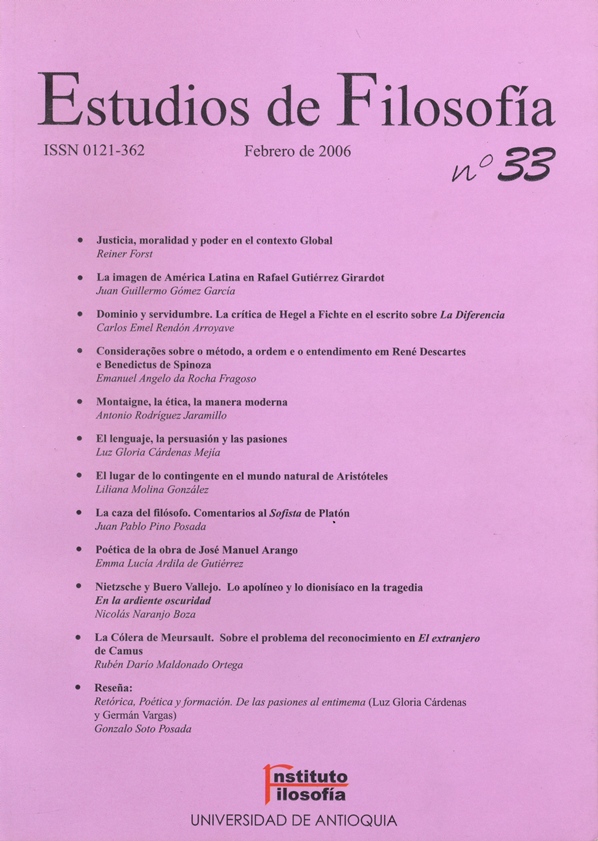Montaigne, ethics, the modern "way"
DOI:
https://doi.org/10.17533/udea.ef.12823Keywords:
Montaigne, moral, ethic, Skepticism, modem thought, judgment, ethos, art of livingAbstract
Montaigne composes a modern Ethics defined by the exercise of his Auto-critical Thought which, united with a philosophical method, treats the construction of the self or a philosophical "way of doing things ". The reflections tries to answer, simultaneously, two issues: How can he provide himself of an ethics that enables him To lead an ordered and sensible existence, when the human condition is marked by disorder and extravagance? And: How is it possible for him to found a modem ethics —before Descartes— with a sceptical position?
Downloads
References
Agustín de Hipona, San. Del libre albedrío. Versión, introducción y notas del P. Evaristo Seijas, en: Obras de San Agustín. (Ed. bilingüe III, Obras filosóficas). Madrid, Biblioteca de Autores Cristianos, 1963.
Baudelaire, Charles. “Le peintre de la vie moderne”, en: (Euvres complétes. Textes établis, présentés et annotés par Claude Pichois. Paris, Gallimard, 1976.
Benjamin, Walter. Discursos interrumpidos I. Prólogo, traducción y notas de Jesús Aguirre. Madrid, Taurus, 1982.
Brahami, Frédéric. Le scepticisme de Montaigne. Paris, Presses Universitaires de France, 1997. DOI: https://doi.org/10.3917/puf.braha.1997.01
Chanon, Pierre. De lasagesse. Texte revu par Barbara de Negroni. Paris, Fayard, 1986.
De Montaigne, Michel. Les Essais. Édition par Piene ViUey, conforme au texte de l'exemplaire de Bordeaux avec les additions de Tédition posthume. Sous la direction et avec une préface de V.L. Saulnier. (3'édition corrigée). Paris, Presses Universitaires de France, 1999.
Descartes, René. Discurso del método. Trad. Jorge Aurelio Diaz. Santafé de Bogotá, Norma, 1992.
____________ . (Euvres de Descartes. Publié es par Charles Adam et Paul Tannery. Nouvelle présentation en co-édition avec le Centre National de la Recherche Scientifique. Pariserin, 1974-1983.
Epicteto. Disertacionespor Arriano. Trad. Paloma Ortiz García. Madrid, Planeta De Agostini, 1999.
____________ . Enquiridión. Trad. José M. García de la Mora. Barcelona, Anthropos, 1991.
Foucault, Michel. Histoire de la sexualité 11. L 'usage desplaisirs. Paris, Gallimard, 1984.
____________ .“Cours du 17 février 1982”. En: L'Herméneutique du su jet. Cows au College de France. 1981-1982. Édition établie sous la direction de Franfois Ewald et Alessandro Fontana, par Frédéric Gros. París, Gallimard-SeuU, 2001.
____________ . “Qu’est-ce que les Lumiéres?”, en: Dits el écrits 11. 1976-1988. Edition établie sous la direction de Daniel Defert et Franfois Ewald avec la collaboration de Jacques Legrange. Paris, Gallimard, 2001.
Friedrich, Hugo. Montaigne. Traduit de 1'Allemand par Robert Rovini. Paris, Gallimard, 1968.
Hegel, GW. Lecciones sobre la historia de la filosofía. Trad. Wenceslao Roces. México, Fondo de Cultura Económica, 1955.
Heidegger, Martin. "La ¿poca de la imagen del mundo”, en: Caminos del bosque. Trad. Helena Cortés y Arturo Leyte. Madrid, Alianza Universidad, 1997.
Koyré, Alexandre. “La penséc moderne”, en: Études d'histoire de la pensée scientifique. Paris, Gallimard, 1973.
____________ . “Entretiens sur Descartes”, en: Introduction a la lecture de Platon suivi de Entretiens sur Descartes. France, Gallimard, 2004.
Nietzsche, Friedrich. “Fragments posthumes, automne 1881”, en: CEuvres philosophiques completes. L v. Paris, Gallimard, 1982.
Nussbaum, Martha. La fragilidad del bien. Fortuna y ética en la tragedia y la filosofía griega. Trad. Antonio Ballesteros. Madrid, Visor, 1995.
Pascal, Blaise. Pensées. Texte établi par Léon Brunschvicg. Paris, GF Flammarión, 1976.
____________ . Entretien avec M. de Sacisur Epictite et Montaigne avec une introduction historique et philosophique par Jean Guitton. Paris, Aubier, Éditions Proveníales, 1946.
Séneca, Lucio Anneo. “De la vida Bienaventurada”, en: Tratados morales. De la vida bienaventurada. De la tranquilidad del ánimo. De la brevedad de la vida. Edición bilingüe, introducción, versión españoola y notas por José M. Gallegos Rocafull. México, Universidad Nacional Autónoma de México, 1944.
Schmid, Wilhem. En busca de un nuevo arte de vivir. La pregunta por el fundamento y la nueva fundamentación de la ética en Foucault. Trad. Germán Cano. Valencia, Pre-textos, 2002.
Downloads
Published
How to Cite
Issue
Section
Categories
License
Copyright (c) 2006 Antonio Rodríguez Jaramillo

This work is licensed under a Creative Commons Attribution-NonCommercial-ShareAlike 4.0 International License.
Authors who publish with this journal agree to the following terms:
1. The Author retains copyright in the Work, where the term "Work" shall include all digital objects that may result in subsequent electronic publication or distribution.
2. Upon acceptance of the Work, the author shall grant to the Publisher the right of first publication of the Work.
3. The Author shall grant to the Publisher a nonexclusive perpetual right and license to publish, archive, and make accessible the Work in whole or in part in all forms of media now or hereafter known under a Creative Commons Attribution-NoCommercia-ShareAlike (CC BY-NC-SA 4.0), or its equivalent, which, for the avoidance of doubt, allows others to copy, distribute, and transmit the Work under the following conditions: (a) Attribution: Other users must attribute the Work in the manner specified by the author as indicated on the journal Web site;(b) Noncommercial: Other users (including Publisher) may not use this Work for commercial purposes;
4. The Author is able to enter into separate, additional contractual arrangements for the nonexclusive distribution of the journal's published version of the Work (e.g., post it to an institutional repository or publish it in a book), as long as there is provided in the document an acknowledgement of its initial publication in this journal;
5. Authors are permitted, and Estudios de Filosofía promotes, to post online the preprint manuscript of the Work in institutional repositories or on their Websites prior to and during the submission process, as it can lead to productive exchanges, as well as earlier and greater citation of published work (see The Effect of Open Access). Any such posting made before acceptance and publication of the Work is expected be updated upon publication to include a reference to the Estudios de Filosofía's assigned URL to the Article and its final published version in Estudios de Filosofía.















